19 Interesting & Fun Facts About Red-Tailed Hawks
Last Updated on
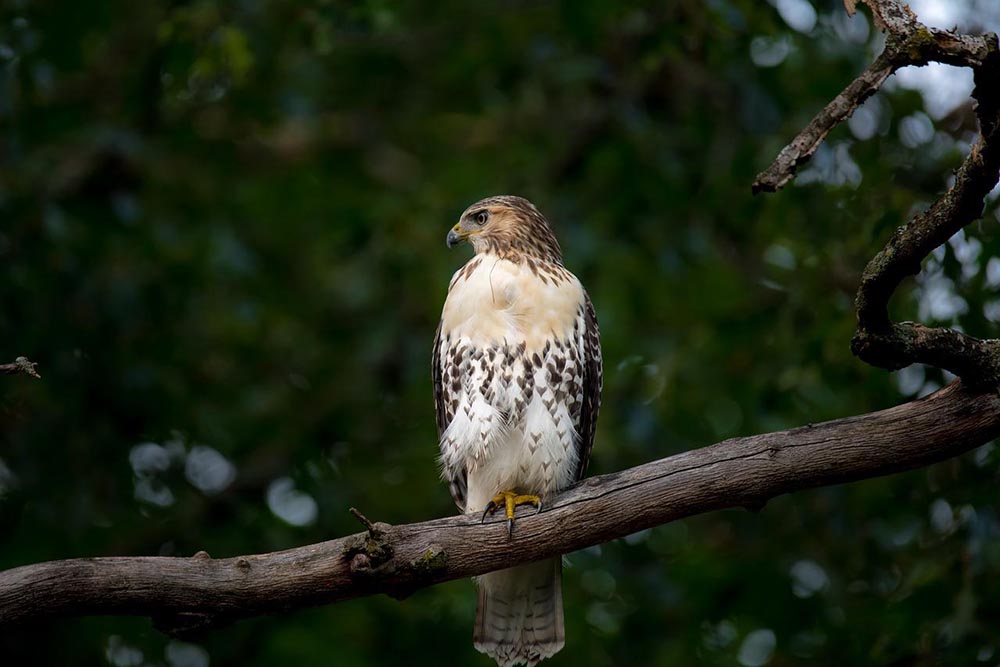
Few birds are as impressive and inspire as much awe as the red-tailed hawk. They’re also fairly common, meaning there’s a good chance that you’ll spot one at some point in your life if you live in the United States or Canada.
With that in mind, here are 19 of the most interesting and fun facts about the red-tailed hawks to further pique your interest.

The 19 Interesting and Fun Facts About Red-Tailed Hawks
1. Red-Tailed Hawks Are the Second Largest Buteo Hawks in North America
According to Cornell University’s “All About Birds” site, the red-tailed hawk is the second-largest buteo hawk in North America. The only larger hawk is the ferruginous hawk.
The red-tailed hawk stands between 17.7 inches and 25.6 inches tall and weighs between 24.3 and 51.5 ounces!
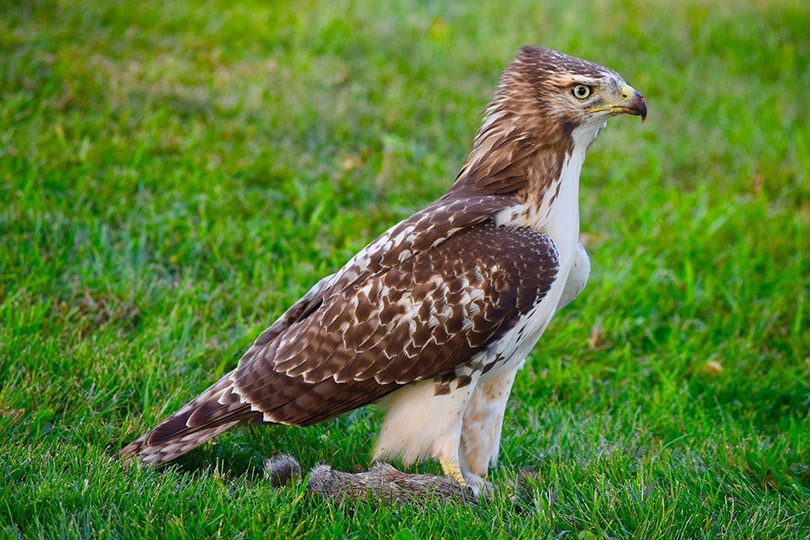
2. Female Red-Tailed Hawks Are Larger Than the Males
Like all hawks, the female red-tailed hawk is significantly larger than the male. The size difference can be quite noticeable too, with the smallest males only having a body length of 17.7 inches and weighing only 24.3 ounces, while the largest females can reach 25.6 inches in length and weigh 51.5 ounces!
3. The Red-Tailed Hawk Has Eyes Eight Times More Powerful Than Those of Humans
Hawks have great vision, and the red-tailed hawk is no exception. With vision that’s eight times more powerful than that of humans, the red-tailed hawk has no problem spotting their prey even when they’re soaring far above.
4. They Don’t All Look the Same
While red-tailed hawks typically have a few similarities in their appearance, there are many morphs out there. What that means is that while two birds may be of the same species, they can have different colorings from each other. Two common morphs include the dark morph and the rufous morph.
5. They Can Eat Prey Larger Than They Are
While the red-tailed hawk generally chooses to feed on smaller prey, occasionally, they’ll go after a 4- or 5-pound rabbit. That’s a full 1–2 pounds heavier than them, making them one of the few animals that will hunt prey larger than they are!
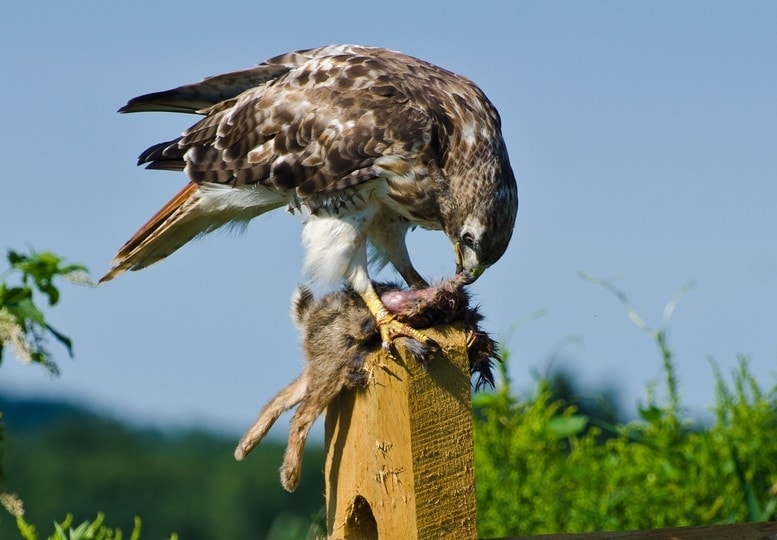
6. About 95% of Their Diet Is Rodents
While hawks have no problem eating all kinds of different prey, they almost always stick to rodents. Between voles, rats, squirrels, and mice, the red-tailed hawk rarely has the need to go after anything larger. That’s why about 95% of their diet is nothing but rodents.
7. They Nest 35 to 75 Feet off the Ground
While 35 to 75 feet off the ground might seem high to us, red-tailed hawks have no problem building their nests and laying their eggs that far off the ground. Even more gravity-defying for their chicks, the nest is shallow and flat, and the sticks and twigs are only about ½” in diameter!
8. The Oldest Known Red-Tailed Hawk Lived to Be 30 Years Old
While the average lifespan of a red-tailed hawk is 20 years old, there’s at least one that’s smashed that record, living to be almost 31 years old. He was a captive bird, but it’s plausible that an older red-tailed hawk has lived in the wild at some point.
9. The Red-Tailed Hawk Can Kite
Kiting is when a bird holds themselves still against the wind, essentially staying in one place in the sky instead of flying around. Few birds can do it, and the red-tailed hawk is one of them. If you’re lucky enough to watch a red-tailed hawk kite, take note, as it’s not something that you’ll see often.
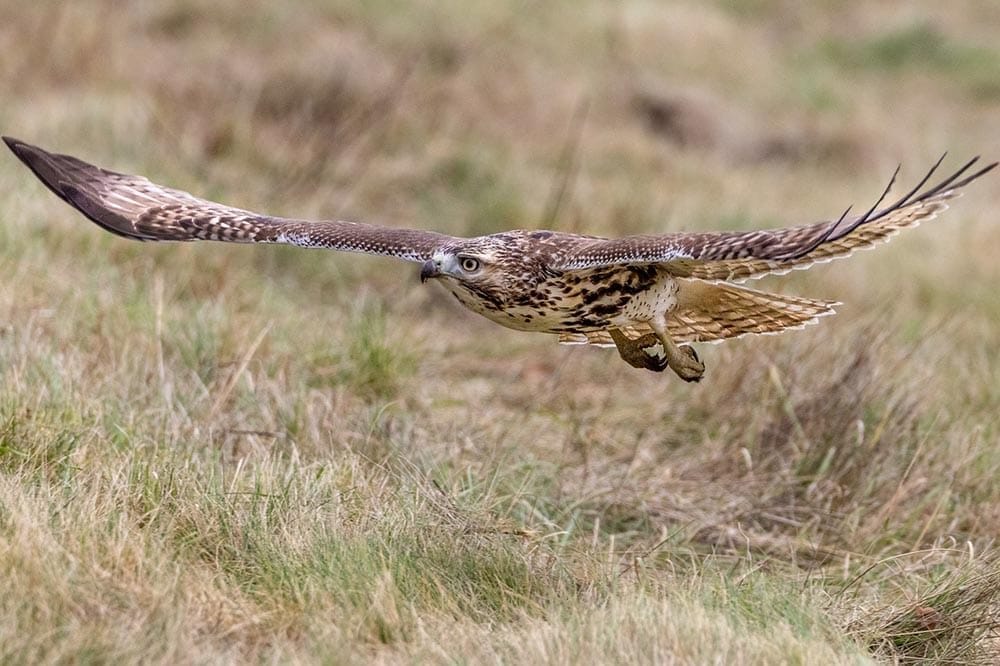
10. They Sometimes Hunt in Pairs
While hawks hunt alone more often than they do in pairs, sometimes they will work together. Two hawks will stake out one half of a tree to catch a squirrel, and when that happens, there’s almost nowhere the squirrel can go.
It’s already not fair when the red-tailed hawk hunts alone, but when they work together, they’re almost unstoppable.
11. Their Range Is Growing
While some birds struggle to adapt to a changing environment due to rising temperatures and human intervention, the red-tailed hawk doesn’t seem to have that problem. Not only are their population numbers increasing, but they’re also adapting to new nesting environments and expanding their range.
12. The Red-Tailed Hawk Has Federal Protection
Due to the Migratory Bird Treaty Act of 1918, certain birds that migrate from the United States to Canada fall under federal protection. The red-tailed hawk is one of those birds, so you can’t hunt them or mess with their nests without explicit permission from the United States government.
13. They Don’t Reach Sexual Maturity Until 3 Years Old
While many other animals reach sexual maturity quickly, the red-tailed hawk takes their time. In fact, red-tailed hawks don’t even bother to select a mate until they’re 3 years old. That’s not particularly surprising considering the longer lifespans of these birds.
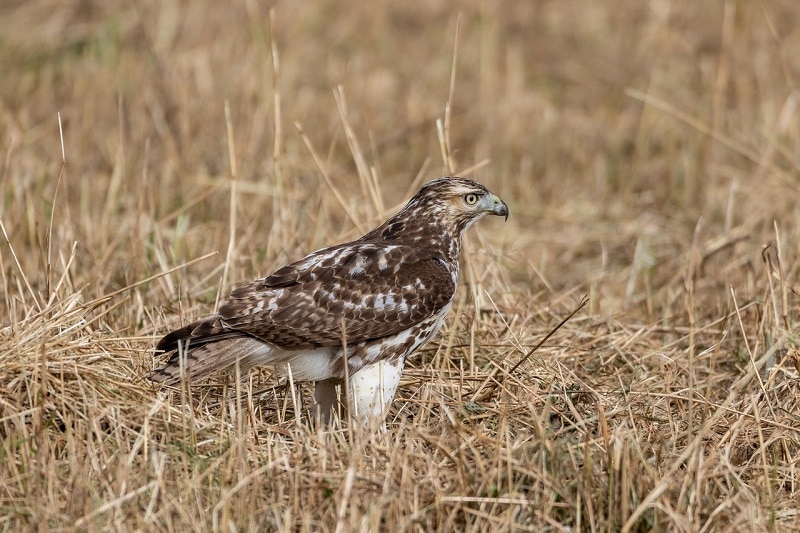
14. Red-Tailed Hawks Mate for Life
It might take a red-tailed hawk a while to find a mate, but once they do, they almost always stay together for life. That said, they will typically find a new mate if their original mate dies.
15. They Reuse Their Nests
While not a guarantee that a red-tailed hawk will reuse their nest for the next mating season, it’s a relatively common occurrence. Since the red-tailed hawk has the same mate every year, reusing their nest gives them an easy location to meet up when the time comes!
16. Both Parents Incubate Eggs
Some bird dads just leave when the eggs come out, but not the red-tailed hawk. Not only do they stick around to help raise their young, but they also have no problem incubating the eggs while the mom is out hunting.
After the eggs hatch, the male does most of the hunting, with the female tearing food up into smaller pieces that the young can eat.
17. Crows Sometimes Take Down a Red-Tailed Hawk
While the red-tailed hawk can take out a single crow, sometimes you’ll witness a flock of crows taking down a hawk. These birds are natural enemies and crows are smart. Instead of letting a red-tailed hawk pick them apart one at a time, they’ll go after the hawk in a group.
With numbers on their side, crows can turn the tide and successfully take down a red-tailed hawk or two — and to finish the job, sometimes they’ll eat the eggs.
18. 14 Subspecies Fall Under the Red-Tailed Hawk
When you’re talking about a red-tailed hawk, you could be talking about any number of birds. There are 14 different subspecies of red-tailed hawks, and they all have their differences. Some travel over long distances to migrate, while others stay in the same place, and their colors and shades are different too.
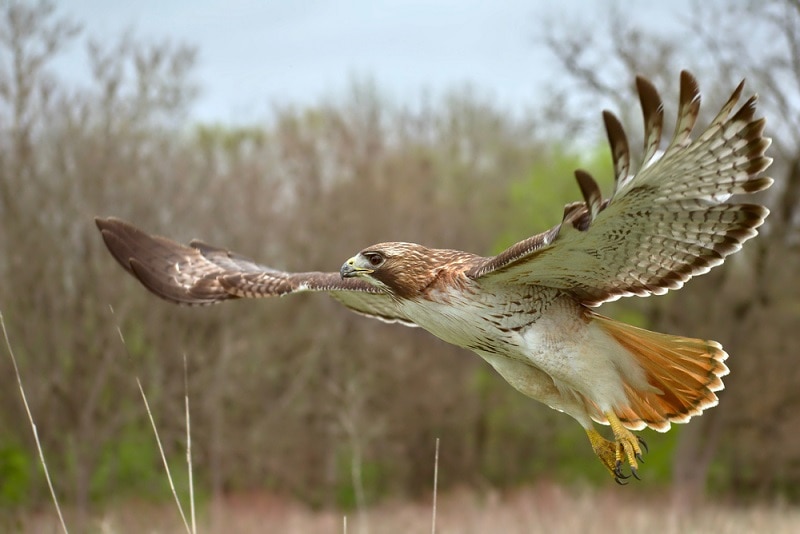
19. They Can Reach Speeds Up to 120 MPH
When hawks are diving, they’re moving fast and that’s an understatement. With a top speed of 120 miles per hour, it’s staggering just how fast they fly. They reach these speeds when diving, and when they’re traveling that fast, their prey doesn’t stand a chance.

Conclusion
Between their impressive feats, characteristics, and relatable demeanor, it’s no surprise that the red-tailed hawk continues to fascinate. So, if you haven’t seen a red-tailed hawk in the wild, we recommend trying to track one down. If you’re lucky enough to watch them dive, it’s something that you won’t forget any time soon.
Featured Image Credit: jasongillman, Pixabay
Table of Contents
- The 19 Interesting and Fun Facts About Red-Tailed Hawks
- 1. Red-Tailed Hawks Are the Second Largest Buteo Hawks in North America
- 2. Female Red-Tailed Hawks Are Larger Than the Males
- 3. The Red-Tailed Hawk Has Eyes Eight Times More Powerful Than Those of Humans
- 4. They Don’t All Look the Same
- 5. They Can Eat Prey Larger Than They Are
- 6. About 95% of Their Diet Is Rodents
- 7. They Nest 35 to 75 Feet off the Ground
- 8. The Oldest Known Red-Tailed Hawk Lived to Be 30 Years Old
- 9. The Red-Tailed Hawk Can Kite
- 10. They Sometimes Hunt in Pairs
- 11. Their Range Is Growing
- 12. The Red-Tailed Hawk Has Federal Protection
- 13. They Don’t Reach Sexual Maturity Until 3 Years Old
- 14. Red-Tailed Hawks Mate for Life
- 15. They Reuse Their Nests
- 16. Both Parents Incubate Eggs
- 17. Crows Sometimes Take Down a Red-Tailed Hawk
- 18. 14 Subspecies Fall Under the Red-Tailed Hawk
- 19. They Can Reach Speeds Up to 120 MPH
- Conclusion
About the Author Robert Sparks
Robert’s obsession with all things optical started early in life, when his optician father would bring home prototypes for Robert to play with. Nowadays, Robert is dedicated to helping others find the right optics for their needs. His hobbies include astronomy, astrophysics, and model building. Originally from Newark, NJ, he resides in Santa Fe, New Mexico, where the nighttime skies are filled with glittering stars.
Related Articles:
Binocular Magnification Chart: Numbers & Distances Compared
10 Types of Hummingbirds in Arkansas (With Pictures)
8 Types of Hummingbirds in Nebraska (With Pictures)
5 Types of Hummingbirds in Idaho (With Pictures)
3 Types of Hummingbirds in Mississippi (With Pictures)
8 Types of Hummingbirds in Kansas (With Pictures)
5 Types of Hummingbirds in West Virginia (With Pictures)
5 Types of Hummingbirds in Ohio (With Pictures)
